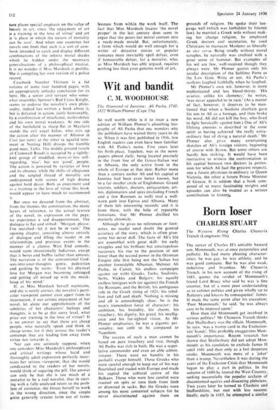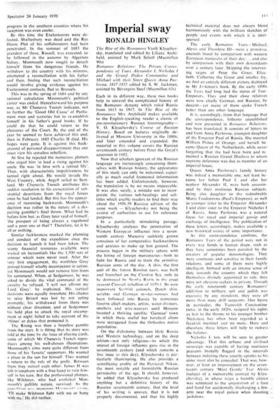Born loser
CHARLES STUART
The Western Rising Charles Chenevix Trench (Longmans 50s) The career of Charles II's amiable bastard son, Monmouth, was at once purposeless and pathetic. He had many pleasing character- istics; he was gay, he was athletic, and he was good company. But he was also weak, indecisive and brainless. Mr Chenevix Trench, in his new account of the rising of 1685, quotes the verdict of Monmouth's friend Lord Bruce who said he was 'a fine courtier, but of a most poor understanding as to cabinet politics and given wholly up to flatterers and knaves by consequence'. James II made the same point after his execution; 'Poor Monmouth.' he said, 'he was always easy to be imposed upon.'
How then did Monmouth get involved in serious politics? Mr Chenevix Trench thinks that Shaftesbury was the villain. Monmouth, he says, 'was a trump card in the Exclusion- ists' hands'. This probably exaggerates Mon- mouth's. importance. Recent research has shown that Shaftesbury did not adopt Mon- mouth as his candidate to exclude James II until 1681 and then only as a last desperate stroke. Monmouth was more of a 'joker' than a trump. Nevertheless it was during the years of the Exclusion Crisis that Monmouth began to play a part in politics. In the autumn of 1680 he toured the West Country, seeking successfully the popular acclaim of discontented squires and dissenting plebeians. Two years later he turned to Cheshire and Staffordshire, but met with less success; finally, early in 1683, he attempted a similar
progress in the southern counties where his reception was even cooler.
By this time the Exclusionists were de- feated, Shaftesbury was dead and the Rye House Plot of his collaborators had been penetrated. In the summer of 1683 the grandest of these, Russell, was executed, to be followed in the autumn by Algernon Sidney. Monmouth now sought to detach himself from his dangerous friends. He withdrew to the country with his mistress, attempted a reconciliation with his father and then, finding that such reconciliation would involve giving evidence against his Exclusionist contacts, fled to Brussels.
This was in the spring of 1684 and by any rational calculation Monmouth's political career was ended. Henceforward his purpose was, as Mr Chenevix Trench indicates, not to further the `Good Old Cause' of Parlia- ment men and sectaries but to re-establish himself in his father's good books. If he could do that he could return to the pleasures of the 'Court. By the end of the year he seemed to have achieved this end; then in February 1685 Charles II died. His hopes were gone. It is against this back- ground of personal disappointment that one must view his senseless rebellion.
At first he rejected the numerous plotters who urged him to lead a rising against his uncle. He was `in love with a retired life'. Then, with characteristic impulsiveness, he turned right about. He would invade the West Country, while Argyll sailed to Scot- land. Mr Chenevix Trench attributes this sudden resolution to his expectation of sub- stantial desertions from the royal forces once he had landed. But this has the appear- ance of reasoning backwards. Monmouth's decision was rather in the nature of a des- pairing gambler's final throw. What had he before him but. as Grey later said of himself. `the prospect of being always a vagabond and a poor one at that'? Therefore, let it be all or nothing.
Similar fecklessness marked the planning and conduct of the expedition once the decision to launch it had been taken. The scanty financial resources available were wasted on inessentials like the 1.500 sets of armour which were never used. After the very first engagement, the worthless Grey proved himself wholly incompetent in action. yet Monmouth would not remove him from his command. When, at Sedgemoor, he was asked to divide the vital command of the cavalry he refused. `I will not affront my Lord Grey', he explained. His tactical decisions were equally irresolute. His chance to seize Bristol was lost by not acting promptly; his withdrawal from there was without clear direction; and at Sedgemoor his bold plan to attack the royal encamp- ment at night failed to take account of the `rhines' or dykes that protected it.
The Rising was then a hopeless gamble from the start. It is fitting that its story was told at the time by the issue of playing cards. some of which Mr Chenevix Trench repro- duces among his well-chosen illustrations. Monmouth's aims were quite different from those of his 'fanatic' supporters. He wanted a place in the sun for himself. They wanted a return to the rule of the godly. Between them they ruined each other. James H was left triumphant with a free hand to ruin him- self in his turn. But the professional plotters. like Wildman. who had exnloited Mon- mouth's gullible nature. survived. As the eanF-Arian svg, nrenaring Pin-•nu"t't'" c,".sre. `I'll make Wildman fight with me or hang with me.' He did neither.







































 Previous page
Previous page